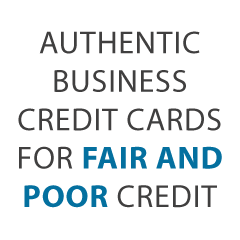- Connect With Us!
- (877) 600-2487
- info@creditsuite.com
Think You Can’t Get Business Credit Cards for New Business with Bad Credit? Think Again! Here’s the Secret
Published By Janet Gershen-Siegel at February 24th, 2019
Get Business Credit Cards for New Business with Bad Credit and Crush Your Competition
You can get business credit cards for new business with bad credit. Yes, really! But let’s talk credit lines first.
Credit Lines
A credit line, or line of credit (LOC), is an agreement between a bank or private investor which establishes a maximum loan balance which a borrower can access.
A borrower can access funds from their line of credit any time, so long as they don’t exceed the maximum set in the arrangement, and so long as they meet any other requirements of the finance institution or investor for instance, making on time payments.
Advantage
Credit lines deliver many distinct advantages to borrowers which include versatility. Borrowers can make use of their line of credit and only pay interest on what they use, compared to loans where they pay interest on the sum total borrowed. Credit lines can be re-used, so as you acquire a balance and pay that balance off, you can use that accessible credit again, and again.
Details
Credit lines are revolving accounts similar to credit cards, and contrast various other forms of financing such as instalment loans. Frequently, lines of credit are not secured, much the same as credit cards are. There are some credit lines that are secured, and because of this easier to be granted
Popularity
Credit lines are the most typically requested loan type in the business world. And even though they are very popular, true credit lines are uncommon, and tough to find. Many are also very tough to get approval for requiring good credit, good time in business, and good financials.
But there are various other credit cards and lines which few know about that are available for startups, poor credit, as well as if you have absolutely no financials.
Many credit line varieties which most entrepreneurs picture come from standard banks and standard banks use SBA loans as their primary loan product for small business owners.
This is due to the fact that SBA covers as much as 90% of the loan in the event of a default. These credit lines are the toughest to qualify for because you must qualify with SBA and the bank.
Check out how we can help you get business credit cards for new business with bad credit.
The SBA
There are two fundamental sorts of SBA loans you can normally get. One kind is CAPLines. There are actually five types of CAPLines that can work for your company.
You can also obtain a lesser loan amount more quickly using the SBA Express program. The majority of these programs offer BOTH loans and revolving lines of credit.
CAPLines
Per the SBA: “CAPLines is the umbrella program under which SBA helps business owners meet short-term and cyclical working capital needs”. Loan amounts are on offer up to and including $5 million. Loan qualification criteria are the same as with other SBA programs.
Seasonal Line
This one advances against anticipated inventory and accounts receivables. It was created to help seasonal businesses. Loan or revolving are offered.
Contract Line
Finances the direct labor and material cost associated with executing assignable contracts. Loan or revolving types are on offer.
Builders Line
This line is made for general contractors or builders constructing or renovating industrial or residential buildings. It is used to subsidize direct labor-and material costs, where the building project functions as the collateral. Loan or revolving types are on offer.
Standard Asset-Based Line
For businesses not able to meet credit standards associated with long-term credit. Financing for cyclical growth, recurring and/or short-term needs. Repayment results from converting short-term assets into money.
Businesses constantly draw from the LOC, based on existing assets, and pay back as their cash cycle prescribes. This line frequently is used by companies that offer credit to other companies.
Small Asset-Based Line
This asset-based revolving line of credit of up to $200,000. This line functions like a standard asset-based line except that some of the more stringent servicing requirements are waived. This is so long as the business can regularly show repayment capability from available resources for the total.
SBA Express
You can get approval for up to and including $350,000. Interest rates can be different, with SBA enabling banks to charge as much as 6.5% over their base rate. Loans over $25,000 will require collateral.
Approvals
To get approval you’ll need good personal and business credit. Plus the SBA says you must not have any blemishes on your report. You will need good bank credit; an acceptable bank score demands you have at least $10,000 in your account over the most recent 90 days.
You’ll likewise need a resume showing you have market practical experience and a well put together business plan. You will need three years of company and personal tax returns.
Also, your business returns should show a profit. And, you’ll need a current balance sheet and income statement, thereby showing you have the money to repay the loan.
Details
To get approval you’ll need account receivables, but just if you have them. As for the collateral to offset the risk, often all business assets will be accepted as collateral, and some personal assets including your home.
It’s not unheard of to need collateral equivalent to 50% or more of the loan amount. You also need articles of incorporation, business licenses, and contracts with all third parties, and your lease.
Private Investors and Alternative Lenders
Private investors and alternative lenders also offer credit lines. These are a lot easier to get approval for than conventional SBA loans. They also need much less documentation for approval. These alternative SBA credit lines frequently call for good personal credit for approval.
Unlike with SBA, many of them don’t call for good bank or business credit approval. Many of these sorts of programs require two years’ of tax returns. Tax returns have to show a profit. Rates can vary from 7% or higher and loan amounts range from $25,000 into the millions.
Loan amounts are in most cases based upon the revenues and/or profits shown on the tax returns. Sometimes lenders may want other financials including a profit and loss statement, balance sheets, and income statements.
Check out how we can help you get business credit cards for new business with bad credit.
Merchant Cash Advances
Merchant cash advances have quickly become the most popular way to get financing, in large part as a result of the simple qualification process. Companies with $10,000 in revenue can get approval, with the business owner having scores as low as 500.
Some sources have now even started to offer credit lines that accompany their loans. You will need to have at least $10,000 in revenue for approval. You should be in business for at least one year, though three years is preferred. Lenders regularly want to see a credit score of 650 or better for approval.
Loan amounts are ordinarily approximately $20,000. Lenders commonly do pull your business credit, so you need to have some credit already established and sometimes lenders will want to see tax returns. Rates vary based upon risk for this program, and there usually are not a lot of funding sources who offer it.
Securities as Collateral
You can get financing despite personal credit if you have some type of stocks or bonds. You can also get approval if you have somebody wishing to use their stocks or bonds as collateral for your financing.
Personal credit quality doesn’t matter as there are no consumer credit requirements for approval. You can get approval for as much as 90% of the value of your stocks or bonds.
Rates are normally under 2%, making this one of the lowest rate credit lines you’ll ever see. You can still earn interest as you commonly do on your stocks and bonds.
Credit Cards and Lines are Very Similar
Credit cards normally offer 0% intro rates for up to two years. So this is very helpful for startups in particular. Credit lines allow you to take out more cash at a much cheaper rate than do cards. These are the primary two differences that will affect you between credit cards and credit line.
Investopedia even says that, “lines of credit are potentially useful hybrids of credit cards.”
Both cards and lines are revolving credit. Credit lines are more challenging to get approval for as card approvals are frequently very fast, many times automated, while line require an in-depth underwriting review. Lines usually offer lower rates, per Bankrate card rates average 13% while lines average 4%.
Business Credit Cards for New Business with Bad Credit: Unsecured Business Credit Cards
A lot of them report to the consumer credit reporting agencies. They all demand a personal guarantee from you. You can get approval in general for one card max as they discontinue approving you when you have two or more inquiries on your report.
Most credit card providers feature business credit cards including Capital One, Chase, and American Express. These have rates much like consumer rates and limits are also similar.
Some report to the consumer reporting agencies, some report to the business bureaus. Approval requirements are similar to consumer credit card accounts.
Inquiries
Typically, when you apply for a credit card you put an inquiry on your consumer report. When other lenders see these, they will not approve you for more credit due to the fact that they have no idea how much other new credit you have lately obtained.
So they’ll only approve you if you have less than two inquiries on your report within the most recent six months. Any more than that will get you refused.
Check out how we can help you get business credit cards for new business with bad credit.
Partners
With unsecured business financing, you partner with a lender who focuses on securing business credit cards. This is a very rare; very little know of program which few lending sources offer.
They can usually get you three to five times the approvals that you can get on your own. This is because they are familiar with the sources to apply for, the order to apply, and can time their applications so the card issuers won’t reject you for the other card inquiries.
Individual approvals often range from $2,000 – 50,000.
Results
The end result of their services is that you ordinarily get up to five cards that simulate the credit limits of your maximum limit accounts now. Multiple cards generate competition, and this means you can get your limits raised generally within 6 months or less of your original approval.
Approvals can go up to $150,000 per entity for instance, a corporation.
With UBF they actually get you three to five business credit cards which report only to the business credit reporting agencies. This is huge, something most lenders don’t offer or publicize. Not only will you get cash, but you build your business credit also so in three to four months, you can then use your newly established business credit to get even more money.
Rates
The lender can also get you low introductory rates, frequently 0% for 6-18 months. You’ll then pay normal rates after that, typically 5-21% APR with 20-25% APR for cash advances. And they’ll also get you the very best cards for points, meaning you get the very best rewards.
Just like with anything, there are huge benefits in working with a source who concentrates on this area; the results will be much better than if you attempt to go at it alone.
Qualifications
You have to have excellent personal credit now, ideally 685 or higher scores, the same as with all business credit cards. You shouldn’t have any derogatory credit reported to get approval. And you must also have open revolving credit on your consumer reports right now. Plus you’ll have to have five inquiries or less in the most recent six months reported.
Fees
All lenders in this space charge a 9-15% success based fee and you only pay the charge off of what you secure. Bear in mind, you get a number of additional advantages and about three to five times more money using this program than you would get on your own.
This is why there’s a fee, the same as all other lending programs.
Add a Guarantor for More Money!
You can get approval using a guarantor and you can even use a wide range of guarantors to get even more money. There are likewise other cards you can get making use of this very same program. But these cards only report to the consumer reporting agencies, not the business reporting agencies. They are consumer credit cards versus business credit cards.
Benefits
 They provide similar benefits including 0% intro annual percentage rates and five times the amount of approval of a solitary card but they’re much easier to qualify for.
They provide similar benefits including 0% intro annual percentage rates and five times the amount of approval of a solitary card but they’re much easier to qualify for.
You can get approval with a 650 score and seven inquiries (or fewer) in the last six months and you can have a bankruptcy on your credit and other negative items. These are a lot easier to get approval for than UBF company credit cards.
With all previous cards discussed, you ought to have good consumer credit to get approval but what if your personal credit isn’t good, and you do not have a guarantor? This is when building business credit makes a lot of sense even when you have good personal credit. It is because developing your company credit helps you get even more money, and without a personal guarantee.
Relax, Because You can Get Business Credit Cards for New Business with Bad Credit
Company credit is credit in a company name, that’s connected to the business’s EIN number, and not the owner’s Social Security Number. When carried out correctly, company credit can be obtained without any personal credit check and without a personal guarantee.
So this is something all other cards above can’t provide. You can get three types of business credit cards. The vendor credit tier offers net 30 terms used to launch a business credit profile.
With the retail credit tier, get credit cards with high limits at most retail stores. And with the cash and fleet credit tiers, get Visa, MasterCard, American Express cards you can use anywhere.
You can get these without any credit check or guarantee. Limits are regularly $5,000 – $10,000 to start, and can exceed $50,000.
Your small business can get credit cards and financing, if you know where to look.
Check out how we can help you get business credit cards for new business with bad credit.

 " class="attachment-blog-single size-blog-single wp-post-image" alt="Get Business Credit Cards for New Businesses Credit Suite-Business Line of Credit Decoded" title="Get Business Credit Cards for New Businesses">>
" class="attachment-blog-single size-blog-single wp-post-image" alt="Get Business Credit Cards for New Businesses Credit Suite-Business Line of Credit Decoded" title="Get Business Credit Cards for New Businesses">>